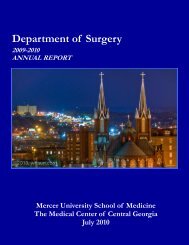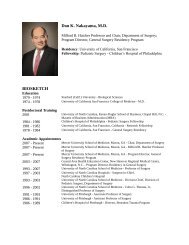Annual Report 09 - MCCG General Surgery Residency
Annual Report 09 - MCCG General Surgery Residency
Annual Report 09 - MCCG General Surgery Residency
You also want an ePaper? Increase the reach of your titles
YUMPU automatically turns print PDFs into web optimized ePapers that Google loves.
Chair’s <strong>Report</strong><br />
The Department of <strong>Surgery</strong> has a tradition of academic and clinical excellence built by Dr Sealy and Dr Dalton<br />
that parallels the growth of the Mercer University School of Medicine. Over the past year we wanted to<br />
build on this foundation through the following goals:<br />
• To train general surgeons who are technically proficient and have mastered the six core competencies of<br />
the Accreditation Council for Graduate Medical Education (ACGME);<br />
• To increase basic science and clinical research production;<br />
• To provide a high level of educational services and opportunities to <strong>MCCG</strong> and MUSM;<br />
• To provide high quality clinical surgical services to the central Georgia region; and<br />
• To run clinical operations in a financially responsible, transparent manner at a moderate expense.<br />
Our objectives and progress toward achieving these goals follow, point by point.<br />
To train general surgeons who are technically proficient and have mastered the six core competencies<br />
of the Accreditation Council for Graduate Medical Education (ACGME).<br />
The <strong>Residency</strong> in <strong>General</strong> <strong>Surgery</strong> is the central effort of the Department. Four chief residents graduate each<br />
year, doubling the two per year finishing in 2002. Since 1995 there have been 33 chief residents who have<br />
graduated from the <strong>Residency</strong>. The largest proportion are graduates of MUSM (8, 24%) and the University<br />
of Mississippi (6, 18%), but have come from as far away as UCLA and the Medical College of Pennsylvania.<br />
Most go into practice without a fellowship (8, 24%), but the rest have had subspecialty training in nearly all<br />
fields of general surgery (vascular surgery<br />
7, 21%; plastic surgery 6, 18%;<br />
cardiothoracic and colorectal surgery, 3<br />
each, 9%; MIS and hand surgery, 2<br />
each, 6%; and surgical critical care, surgical<br />
oncology, and breast surgery, 1<br />
each, 3%.) Nearly all are in private<br />
practice (28 of 29 not in fellowship,<br />
96%), nearly half in Georgia (14 of 28,<br />
50%) or the southeast U.S. (10 of 26,<br />
36%).<br />
Our objective is to achieve a 90% first<br />
taker pass rate for the Qualifying and<br />
Certifying Examinations (QE and CE,<br />
respectively) of the American Board of<br />
<strong>Surgery</strong> (ABS). Over the past five years<br />
(2002-2006) our first taker QE pass<br />
rate was 80%, CE, 77%, and combined<br />
QE and CE, 60%. These levels clearly<br />
do not meet our desired level of 90%.<br />
14
















